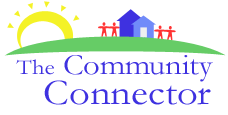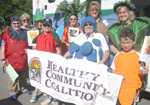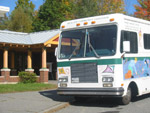Maine State Grange
| Address: | 146 State Street Augusta, ME 04330 |
|---|---|
| Phone: | (207) 623-3421 |
| Fax: | (207) 623-2928 |
| Website: | Website |
| Contact: | Steve Verrill, President |
| Services: | The Grange came into being in 1867 because of the vision of Oliver Hudson Kelley, a Minnesota farmer and activist. He had long held that farmers, because of their independent and scattered nature, needed a national organization that would represent them much as unions were beginning to do for industrial workers. Farmers were at the mercy of merchants for both needed farm supplies and for marketing their crops. Railroads and warehouse companies were taking advantage of farmers as well. Kelley and some of his friends organized the National Grange (officially known as the Order of Patrons of Husbandry) as a fraternal group similar to the Masonic lodge. The early leaders were responsible for promoting cooperatives that had the potential of helping farmers economically. Effective lobbying efforts were undertaken early and this activity remains a bulwark of Grange service to rural America. Education of rural residents was championed by the early Grange and, due to Grange agitation, dramatic improvements were made in rural schools. The birth of the Extension Service, Rural Free Delivery, and the Farm Credit System were largely due to Grange lobbying. The Grange at all levels is strictly nonpartisan and does not endorse candidates for public office nor contribute to their campaigns. At the national level, the Grange actively lobbies for causes that are in accord with organizational policy. All policy within the Grange originates at the local level and the organization remains as one of America's best examples of democratic grass-roots activism. The primary legislative objective of the Grange is to represent the views of rural residents and the agricultural community. These issues include public transit, farm programs, rural economic development, education, health and safety concerns and many others. Each year the policies are summarized and published in booklet form. Early in its history Grange leaders realized that social interaction was especially important to rural residents. For nearly 130 years Grange halls have existed as community centers where residents gather for educational events, dances, potlucks, town meetings, political rallies and other meetings. Junior Grange, 4-H, FFA, scouting and Camp Fire groups have thrived because of Grange involvement and each year tens of thousands of Grange members participate in numerous community service projects. A wide variety of social, leadership and educational opportunities for members of all ages have been made available throughout the organization' s long history. Members not only receive personal satisfaction from accomplishing something they enjoy, but they share in the greater reward of being an active part of an organized effort to bring people together for good times, constructive activities and honest, hard-working community building. The National Grange Health Program promotes service, education, and understanding through Granges and the Deaf Community. The four levels of the Grange have committees for programs to raise money and provide services to the Grange and the Deaf Community. The Grange presents scholarships at the national, state, and local levels and supports Governor Baxter School for the Deaf, mainstreamed students, teachers of the deaf, and various agencies working with the Deaf Community. |









